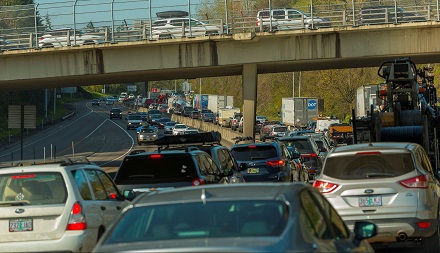The tolling strategy is expected to be determined in the year 2023
Enacted as part of the
2017 Transportation Package passed by the Oregon Legislature, the I-205 Toll Project will use variable-rate tolls to manage congestion and raise revenue. The idea is to charge more during peak times as a disincentive to reduce congestion.
The Oregon Department of Transportation is investing in transit, bicycle and pedestrian facilities and changing how we manage roads for safety and traffic flow. According to ODOT, tolling is another necessary tool to fix our transportation system. They say that tolls bring more reliable trips and address congestion in the metro region, reduce greenhouse gas emissions, and fund bottleneck relief projects. We know Oregonians across the state need to get to and through the Metro region. While there's no doubt that delay and congestion come at a high cost to individuals, businesses, and communities, congestion itself is a deterrent.
ODOT engineers point out that in 2020, the traffic counts declined with the COVID-19 pandemic but are now back to about 90% of pre-pandemic levels and expected to return to 2019 levels as the economy improves.
ODOT maintains that tolls can help manage congestion and provide a more reliable trip by encouraging drivers to consider other travel options -- including detouring through neighborhoods to avoid the toll -- or times of travel. They say that a large change in trip making isn't needed for significant benefits. Even a small decrease in the number of people trying to get on the highway will have travel time benefits for those who can't modify their trip.
In addition, funding for seismic, safety, climate and congestion improvements has not kept pace with inflation. This is largely due to the "per gallon" tax on fuel to fund roads. Gallons increase as miles increase, but the tax collected doesn't keep pace with inflation.
Tolling on I-205 would consist of an all-electronic system that would automatically collect tolls from vehicles traveling on the corridor. Drivers will not stop to pay a toll. A transponder, a small sticker placed on the windshield, is read and connected to a pre-paid account. If a vehicle doesn't have a transponder, a camera captures the car's license plate, and the registered owner is billed.
ODOT is analyzing three alternatives as part of the formal environmental review. Three other alternatives were considered in 2020 and found to provide fewer benefits. They were dropped from the analysis.
Alternatives currently under review include:
Alternative 3: Bridge Tolls on the Abernethy Bridge and Tualatin River Bridges

- Tolls on reconstructed bridges over Tualatin River and Willamette River.
- Split toll amount between two locations.
- Through trip pays more than local access trip.
- This image shows Alternative 3, which would individually toll multiple bridges to be rebuilt.
Alternative 4: Segment-Based Tolls between Stafford Road and OR 213

- Toll split across four segments: amount paid depends on number of segments traveled.
- Most flexible for traffic operations management.
- More complex pricing structure to communicate to users.
- This image shows Alternative 4, which includes segment-based tolls from Stafford Road to Oregon 213.
No Action Alternative: No toll would be applied
- Benefits would not be realized to help manage congestion or raise revenue for transportation projects.
ODOT is in the environmental review phase, which began in 2020. Following a public comment period in summer-fall 2020, the I-205 Toll Project is moving forward with an analysis of the three alternatives. This phase will include:
- An assessment of the potential for additional diversion onto the surrounding street system, especially onto neighborhood streets designed for low speed, low volume conditions.
- An evaluation of existing transit during peak periods to accommodate any shift in travel modes.
- An assessment of whether improved reliability on I-205 will make bus service on the highway a viable option to improve the currently limited public transportation options between West Linn, Oregon City and the I-5 corridor.
- Evaluation of other potential benefits and impacts of the tolling alternatives.
- Consideration of equity and mobility strategies to ensure people of all demographics receive travel benefits.
The ODOT project team has summarized all the public comments in a report and responded to the concerns, ideas and recommendations provided. In 2023, the Federal Highway Administration, in cooperation with ODOT, is expected to decide which alternative to implement based on the analysis conducted, existing policy and guidance, and community and stakeholder feedback.
--Staff Reports| Post Date: 2021-07-31 10:57:35 | Last Update: 2021-07-31 11:40:15 |








